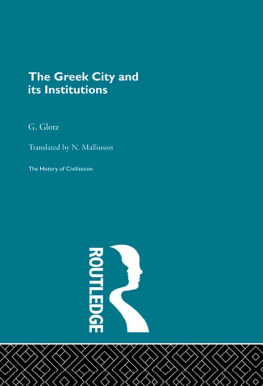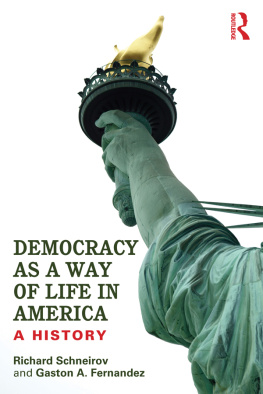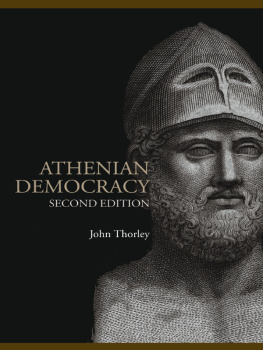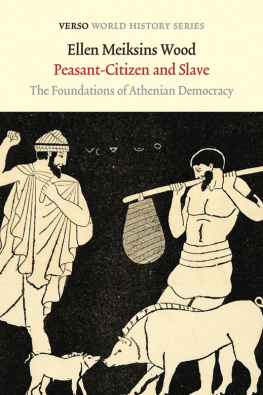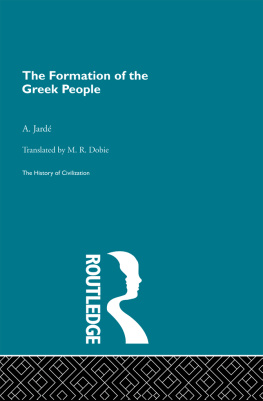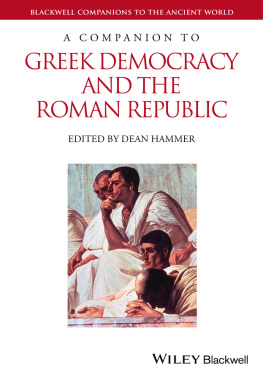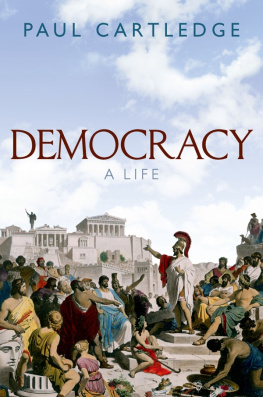THE HISTORY OF CIVILIZATION
THE GREEK CITY AND ITS INSTITUTIONS
THE HISTORY OF CIVILIZATION
General Editor C. K. Ogden
The History of Civilization is a landmark in early twentieth Century publishing. The aim of the general editor, C. K. Ogden, was to summarise in one comprehensive synthesis the most recent findings and theories of historians, anthropologists, archaeologists, sociologists and all conscientious students of civilization. The History, which includes titles in the French series LEvolution de lHumanit, was published at a formative time in the development of the social sciences, and during a period of significant historical discoveries.
A list of the titles in the series can be found at the end of this book.

First published in 1929 by Routledge, Trench, Trubner
Reprinted in 1996,1998 by Routledge
2 Park Square, Milton Park,
Abingdon, Oxon, 0X14 4RN
&
270 Madison Ave,
New York NY 10016
Transferred to Digital Printing 2008
1996 Routledge
All rights reserved. No part of this book may be reprinted or utilized in any form or by any means electronic, mechanical, or other means, now known or hereafter invented, including photocopying and recording, in any information storage or retrieval system, without permission in writing from the publishers.
British Cataloguing in Publication Data
ISBN: 0-415-15579-7
ISBN: 978-1-136-19706-2 (ePub)
ISBN Greek Civilization (7 volume set): 0-415-15612-2
ISBN History of Civilization (50 volume set): 0-415-14380-2
Publishers Note
The publisher has gone to great lengths to ensure the quality of this reprint but points out that some imperfections in the original may be apparent
FOREWORD
This work which contributes in one of its aspects to the study of theGreek miraclefills also an important placebetween From Tribe to Empire and Roman Political Institutions in the study of political institutions.
There areas has already been notedhistorians as well as sociologists for whom sociology is quite distinct from history ; sociologists who recognize only necessity in their science and historians who recognize only chance in their discipline find themselves in agreement upon this point of distinction. From our point of view, however, history, the all-embracing study of past events relating to man, necessarily includes sociology. The closely woven web of facts of every kind of which history is composed is interwoven with events demonstrating an inherent necessity in social developmentwith what we may call mental logicas well as with innumerable chance happenings. Specialists working in the field of abstractions and generalizations can, undoubtedly, by comparative studieswhether of institutions on the one hand or of religion and intellectual and cesthetic activity on the otherset forth general facts ; but history furnishes the material for these generalizations, and the result of the comparison, when brought to bear on the facts of history, throws human evolution into relief picks out the path it has followed from the mass of groupings, recurrences and regular stages, and leads one to seek in logicin the meaning we give to this word for the fundamental cause of these recurrences.
In From Tribe to Empire the social aspect as such was dealt with. We there put forward the problem of the origins of society, of the relations between society and the individual, and, as an hypothesis, distinguished various phases of social organizationphases characterized precisely by the varying nature of these relations. It is our belief that society only exists by virtue of the individuals who compose it, but that in order to consolidate its position and attain to maturity, it has at a certain point to submerge the individual until the day when the latter asserts himself in some way and consciously strives to bring society to perfection by means of the intellectual and spiritual development which it has made possible.
We followed in the East of antiquity the progress ofpolitical organization from the humble germs of individualized power to the formation of strongly centralized kingdoms and vast empires it is an example, a model ek .
This book, which Gustave Glotz was peculiarly well-equipped by all his previous works to write, has a twofold interest : on the one hand it traces, with remarkable erudition, the evolution of Greek institutions, brings out their essential characteristics and, to a certain extent, enters into the details of their construction ; and, on the other hand, it formulates and suggests the general ideas which such a subject admits of and leads on to considrations of a sociological bearing. It combines strict realism and explanations of deep insight.
Fustel de Coulanges explained marvellously well ; he explained too well, too simply, too logically. The respect which Glotz feels for hismasterpiece does not prevent him from criticizing it. Human societiesare not geometrical figures, but living organismsTruth is always complex when it is concerned with men... who toil and struggle and are subject to the common needs of humanity
* * * * * * *
This book deals first, therefore, with the genesis of the . The fluid term polis signified the acropolisthe fortified town as opposed to the open village, before it was applied to the city..
The Homeric poems show us a society in process of evolution. The king of kings,the most royal, for the , originally, is the chief of the yevos, the man who advances ahead of the others
When aristocracy destroys the king in his capacity of leader in war and justiciary, he still remains a , high-priest9 just as at Rome after the fall of the kings there remained a rex sacrorum. For centuries a single class, more or less numerous, and very variously recruited, holds power in the cities. Glotz emphasizes thedisconcerting multiplicity of forms which oligarchic government assumes: as a general rule it is not the government of thebest (. Moderate oligarchy, moreover, borders upon moderate democracy, andit is impossible to say exactly where one ends and the other begins(p. 79). His keen sense of the complexity of reality prevents Glotz herefrom making distinctions which would be too absolute and theoretical.
Finally, democratic government is establishedthe rule of state authority in place of the authority of chiefs, of individual responsibility in place of collective responsibilitya system prepared by thetyrants whose guiding principle and transitory function isto humble the aristocracy and uplift the lower classes(p. III) : An inherent contradiction doomed tyranny to death as soon as it had infused life into democracy (p. 116)
The latter comes to full maturity thanks to the liberation of the individual, who repays to the city in strength what he has gained from it in independence. Thegreat mistake which Fustel de Coulanges made was to establishan absolute antinomy between the omnipotence of the city and individual liberty
Next page
